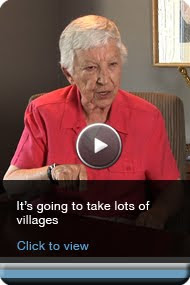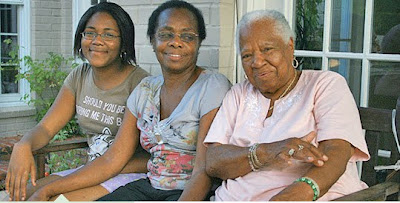
Saturday, January 30, 2010
Thursday, January 7, 2010
Who's Paying The Bills Now?

What do you do when a parent or loved one who has handled the family finances for years is suddenly not capable to continue?
- Close your eyes and hope they pay themselves.
- Throw up your hands and yell “Uncle!”
- Spend a lot of money to pay a professional to figure it out for you.
- Do it yourself.
Wednesday, December 30, 2009
They Call it Home Sweet Home: But is it Safe for People with Memory Loss to Live Alone?

But when a relative shows signs of memory loss or is diagnosed with Alzheimer’s disease or another form of dementia, and her condition worsens, family members often have to determine if their relative is safe living alone at home. A person with dementia may not be aware of the safety and health issues that her living situation presents.
So, what is safe? The answer can vary from family to family and even among family members. Some of us will tolerate risky or uncertain situations longer than others. To help you make the determination if your relative is safe, click here for some questions for you and your family to think about:
Wednesday, December 23, 2009
When You Don't Live Close To An Aging Parent

For years I lived a train ride away from them in NYC. In 2000 I moved with their enthusiastic blessings to start a life with my husband in California. My siblings are settled with jobs and families in the mid- and southeastern US. My father’s wife is fit and healthy but housebound by his needs. She needed respite.
Scenarios like mine play out each and every day in thousands of American’s lives. How do you manage this situation without picking up and moving your family or your parent?
If this scenario sounds familiar, remote caregiving might be the answer. Fortunately, there are now many home care agencies which focus on remote caregiving and taking the burden off families and loved ones of those that need care. Nursing homes and assisted living facilities are not the only options available. Non-medical home care allows your loved ones to live where they want to be... their own home.
Click here for some questions to consider when determining if your loved one needs professional care.
Tuesday, December 22, 2009
Making the Holidays Count for You and Your Relative

Holidays are often a time for families to be together, for sharing and carrying on traditions that have long been a part of a family’s history. But for families affected by Alzheimer’s disease or other forms of dementia, holidays can be a time when a person with memory loss may not be able to participate as she (or he) once did in activities or conversations. The question then becomes “How can we best get through the holidays with minimal upset and frustration for all of us?”
Holidays can be a time of heightened activity, sounds, and get-togethers.By adjusting your expectations and doing some planning ahead of time, holidays can be an enjoyable time. Here are some suggestions for getting your family ready for and through the holiday season.
Recognize that holidays may not be the same as they have been in the past. Adjusting your expectations and schedule ahead of time may help you. Common feelings of loss, sadness, and anger at the disease may be heightened at this time of the year. Talk with other family members who are likely to be experiencing some of these same feelings and may have some suggestions of how to cope.
Give yourself permission to do only what you can manage. Ask other family members and friends to help you with decisions, celebrations and events. You may be surprised how willing others are to help you, but you have to accept help when help is offered, or ask for help when you need it.
Discuss with family and close friends how the holidays will be celebrated: What traditions will you observe? What traditions or events will you not do this year?
Help prepare visitors for their visit with your relative. Family members and friends, who have not seen your relative in a while, may be surprised at the changes your relative has experienced. Tell them what to expect, in either a letter email or a phone call.
“ While I am looking forward to your visit, I thought it might be helpful for you to know what to expect and how mom is doing before you arrive. Mom is having more problems remembering and recognizing people. Although she may not recognize you, I am confident she will appreciate your company and so will I. Please do not think it is strange when I introduce you, sometimes this helps mom be more relaxed. I have some old photos of our vacations at the cabin that I thought we would enjoy looking at together….. “
Think through where your relative is most comfortable celebrating the holiday: in her home or your home? Some people with memory loss are more relaxed being in their own home. Many families find that taking the holiday celebration to their relative is better than taking their relative to a holiday celebration. Too much noise and activity, and too many people can be hard for some people with memory loss to tolerate no matter where they are.
Try several celebrations rather than one large celebration. If your relative lives in a residential care home, find out when the holiday activities are scheduled and plan to visit during those times. Participate in the sing-a-long with other residents; bring a favorite holiday food, etc.
Consider celebrating with your relative before or after the holiday. Many families with a relative in the middle – late stages of Alzheimer’s disease, find that celebrating a holiday a few days before or after the actual holiday, may be more manageable for them and less stressful for their relative. Separate celebrations may be easier for everyone. A holiday is still a holiday wherever and whenever you celebrate it with your relative.
Maintain your relative’s routine as much as you can to avoid increased confusion. Schedule holiday activities around rest times and meal times as much as possible.
Be alert to signs of agitation, fatigue and increased confusion. Facial expressions such a furrowed brow or tense mouth, pacing, increased tapping fingers or slapping hands on table, and loud outbursts may indicate the person with memory loss may be overwhelmed or over stimulated and needs to get away from a noisy or crowded room.
Try altering traditions, not eliminating them. Most people with Alzheimer’s disease, or other types of memory disorders, can enjoy the spirit of the holidays, especially if this time of year was important to them in the past. Holiday baking, holiday cards, sing-along, gift wrapping, being with grand children, etc. can be adapted to your relative’s abilities, length of attention span or your relative’s best time of day.
Enjoy the moments when meaningful activities and conversations occur, even if they are not as long as you might wish.
Keep it simple. Keep in mind it is not how much you do, but the enjoyment your relative receives from doing things and being with family and friends, if even they are different from past holidays.
Laurie White MSW
For More Information Visit Ask The Experts




